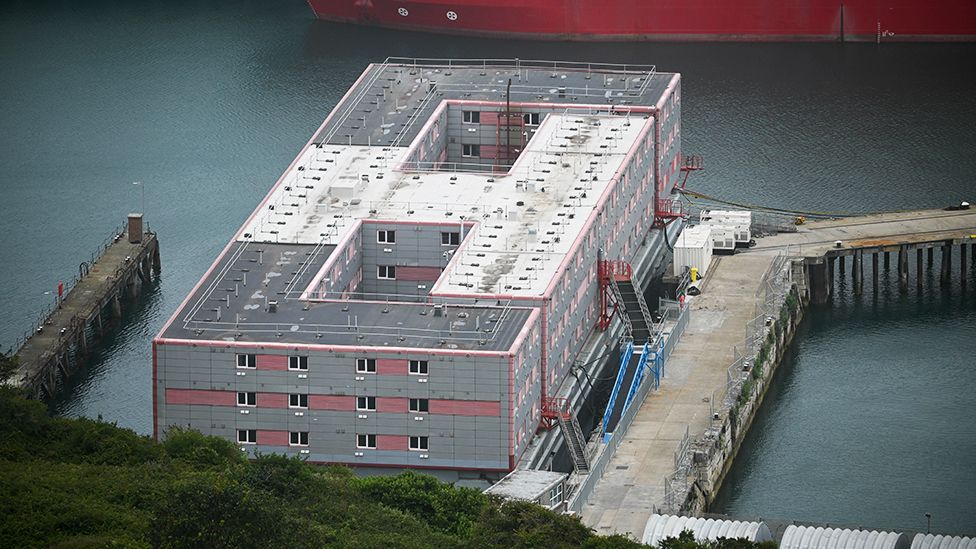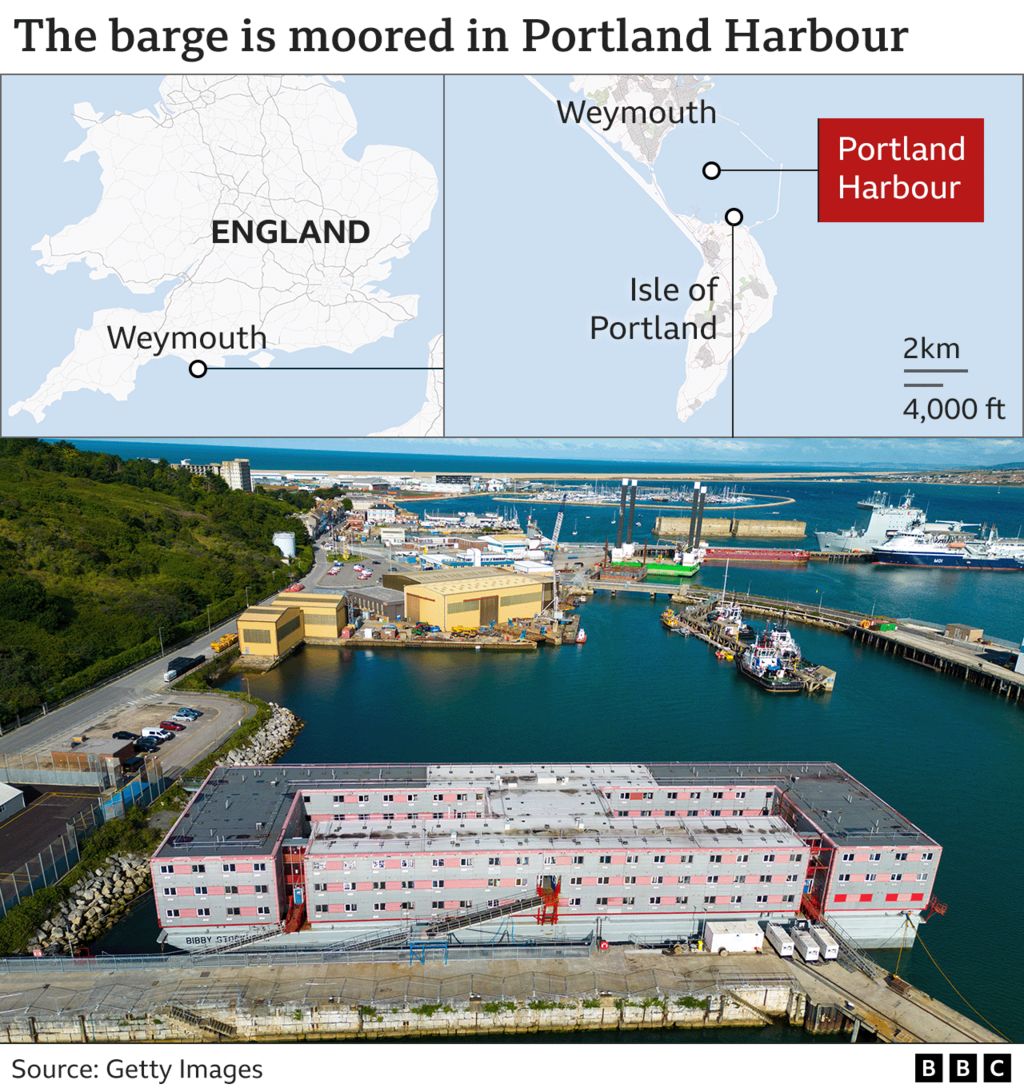[Uk] Bibby Stockholm: No-one harmed over discovery of Legionella on barge - health secretary
Image source, Getty ImagesBy Thomas Mackintosh & Oliver SlowBBC News"Instant action" was taken to move 39 asylum seekers from the Bibby Stockholm barge after Legionella bacteria was found last week, the health secretary said.Steve Barclay was questioned over why people were moved in when officials knew tests were being conducted.He told BBC Radio 4's Today programme that "no-one has been harmed". Home Office ministers say the presence of bacteria was confirmed to them on Thursday, and they then took action.In an interview with Sky News, Mr Barclay said: "As soon as ministers were notified on Thursday night, there were some concerns with that, they took instant action."The barge had been billed as a cheaper alternative to hotels for asylum seekers awaiting the outcome of their claims. The government eventually plans to house up to 500 men aged 18-65 on the vessel moored in Portland Port, Dorset, while they await the outcome of asylum applications. They added the Home Office was "led" by
![[Uk] Bibby Stockholm: No-one harmed over discovery of Legionella on barge - health secretary](https://www.9020blog.com/uploads/images/202308/image_750x_64db1d1f7d38e.jpg)

"Instant action" was taken to move 39 asylum seekers from the Bibby Stockholm barge after Legionella bacteria was found last week, the health secretary said.
Steve Barclay was questioned over why people were moved in when officials knew tests were being conducted.
He told BBC Radio 4's Today programme that "no-one has been harmed".
Home Office ministers say the presence of bacteria was confirmed to them on Thursday, and they then took action.
In an interview with Sky News, Mr Barclay said: "As soon as ministers were notified on Thursday night, there were some concerns with that, they took instant action."
The barge had been billed as a cheaper alternative to hotels for asylum seekers awaiting the outcome of their claims.
The government eventually plans to house up to 500 men aged 18-65 on the vessel moored in Portland Port, Dorset, while they await the outcome of asylum applications.
They added the Home Office was "led" by the UK Health Security Agency (UKHSA), which did not recommend evacuation until Thursday night.
Prof Dame Jenny Harries, the agency's chief executive, said that Legionella bacteria detected in routine tests would not "necessarily indicate there is a systemic problem".
"Just finding Legionella does not necessarily mean there is a significant risk to human health," she said.
"It is primarily the responsibility of the operator or the manager of the premises or with the services to ensure that is fully managed before there are people using the services."

Dorset Council said it informed government contractors about preliminary Legionella test results last Monday, adding a Home Office official was told the following day.
A senior Home Office source told BBC News the person notified on Tuesday was a "junior" member of staff who happened to be on a call with contractors.
The source added the department did not receive a formal notification of the presence of Legionella until late Wednesday.
On Thursday further results "changed the picture" and Dame Jenny said the Home Office made a decision to remove asylum seekers from the vessel as a precaution before the UKHSA made a recommendation to do so.
Legionella bacteria can cause Legionnaires' disease, a type of pneumonia. Around 5%-10% of cases are fatal.

Headline-grabbing distraction

Without an engine and now virtually empty, the Bibby Stockholm has come to symbolise the UK's response to its asylum crisis.
A functional deterrent to those who might abuse our generosity, according to ministers. Dead in the water, critics say - a cruel dereliction of Britain's responsibilities to those fleeing conflict and persecution.
The arguments over the contaminated water will rumble on, but the barge is a headline-grabbing distraction from the real problems of an asylum system even the government accepts is broken.
The barge comes at a financial cost too, of course, and a number of senior Conservative MPs are now publicly fuming at the political price the party is paying.
It will be pointed out the number of migrants who crossed the Channel on Saturday alone would more than fill a barge, but that would miss what lies at the heart of this problem.
Asylum applications have increased in the last couple of years. But, the backlog of people waiting for the Home Office to make a decision on on their claims has gone up even faster.
It was rising before small boats became an issue. Despite a big increase in caseworkers, it is still at almost record levels.
The prime minister's promise to end the asylum crisis relies on deterring migrants from coming. But change so far appears as sluggish as an engineless barge in Portland Harbour.

Tim Parkinson, director of water treatment specialists Feedwater, said it was fairly common for large domestic water systems to become contaminated.
He told the BBC that only in "relatively high-risk" situations would people be moved from a contaminated site.
The government has faced internal criticism over its handling of the Bibby Stockholm.
David Davis, a Conservative MP, said that it highlighted "startling incompetence" in the Home Office, while former party chairman Sir Jake Berry described the removals as "farcical".
Meanwhile, Labour leader Sir Keir Starmer said that barges were not a solution to the "broken" asylum system.
"I don't want to keep barges or hotels or airfields, for that matter," he said, but added that a Labour government would "inherit a very difficult situation" and manage it "as best we can".
For the government, Steve Barclay said "progress is being made" on the government's flagship migrant policy.
"We recognise there is more to do," he added. "The barge is one aspect of that. We need to go further."
His comments came after six people died when a small boat got into difficulty in the English Channel. Fifty-nine people, many of them Afghans, were rescued.

Who knew what and when?
- Tuesday 25 July - Water samples collected from the barge for what the Home Office called "routine precautionary tests for Legionella".
- Monday 7 August - First group of migrants arrive. Dorset Council receives test results and informs contractors CTM and Landy and Kling that Legionella has been detected. The Home Office says "low levels" were found at that stage.
- Tuesday 8 August - Council inspection team meets barge operators. A Home Office official was "verbally" made aware of the results, according to the council - a government source told the BBC it was a "junior" official who happened to be on a call where results were discussed.
- Wednesday 9 August - Council inspection team takes further samples and contacts the local UK Health Security Agency (UKHSA) that evening. The new results "changed the picture", a government source told the BBC. The Home Office was officially notified later on 9 August, according to the government.
- Thursday 10 August - UKHSA chief Jenny Harries says she was informed of the results "first thing" and the agency "jumped in immediately", meeting staff from the Home Office, Dorset Council and the NHS. Ministers were told about the discovery that evening. UKHSA recommends that six people who have recently boarded the barge are removed.
- Friday 11 August - Home Office announces it is removing all 39 people from the barge as a "precaution".
- Monday 14 August - Health Secretary Steve Barclay says health assessment is being carried out but "no-one has been harmed".
Related Topics
What's Your Reaction?








![[Uk] Stradey hotel: Asylum seekers' Llanelli arrival not imminent](https://www.9020blog.com/uploads/images/202308/image_650x433_64e5db73c5473.jpg)
![[Business] Car insurance hits £500 a year for average UK driver](https://www.9020blog.com/uploads/images/202308/image_650x433_64d6f3cf33f48.jpg)



![[Entertainment] Idris Elba: Actors in video games like Phantom Liberty is 'sign of the times'](https://www.9020blog.com/uploads/images/202309/image_750x415_6512c6d8254e4.jpg)
![[World] Ukraine war: Russia demands UN court throw out case against it](https://www.9020blog.com/uploads/images/202309/image_750x415_650957bed2ad4.jpg)
![[Entertainment] Olivia Rodrigo: Second album Guts goes straight to number one in UK](https://www.9020blog.com/uploads/images/202309/image_750x415_65055ae91776d.jpg)

![[Business] BMW investment secures future of Mini factories](https://www.9020blog.com/uploads/images/202309/image_750x415_64ffe58cc2284.jpg)